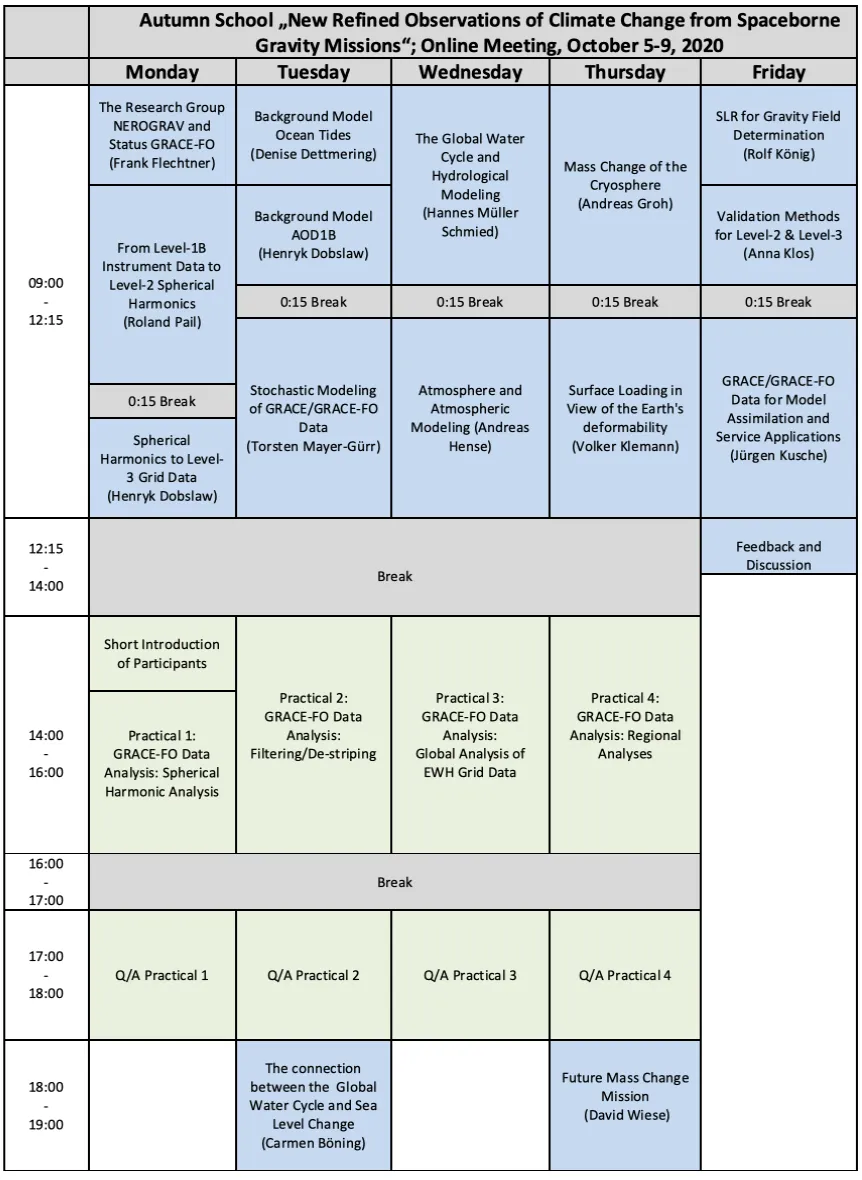
International Autumn School NEROGRAV
”New Refined Observations of Climate Change from Spaceborne Gravity Missions“
October 5-9, 2020; online Meeting
Call for Applications
Background
Between 2002 and 2017 the Gravity Recovery and Climate Experiment (GRACE) satellite mission provided a unique 15+ years times series of monthly changes of large ice sheets and glaciers, near-surface and underground water storage, the amount of water in large lakes and rivers, or changes in sea level and ocean currents. The observation of mass change provides fundamental indicators of the large-scale climate dynamics and state of our planet, and an integrated global view of how Earth’s water cycle and energy balance are evolving. Since 2018 GRACE Follow-on (GRACE-FO) successfully extends this time series and demonstrates the effectiveness of a tech demo Laser Ranging Interferometer for future gravity missions.
Only by concurrently improving and better understanding of sensor data, background models, and processing strategies of GRACE and GRACE-FO satellite gravimetry, the resolution, accuracy, and long-term consistency of mass transport series from satellite gravimetry can be significantly increased; and only in that case the potential of future technological sensor developments can be fully exploited.
The autumn school „New Refined Observations of Climate Change from Spaceborne Gravity Missions“ will educate a group of 35 Ph.D. students and junior scientists in state of the art GRACE and GRACE-FO satellite gravimetry data processing (e.g. spherical harmonic analysis, filtering/de-striping, global/regional analysis of grid data) and applications of mass transport data in Earth system sciences related with the global water cycle, the oceans, the cryosphere or the atmosphere.
Program
Lectures and practicals given by key members of the Research Group NEROGRAV* will be augmented by selected topics presented by international experts:
- P. Abrikosov (TU Munich)
- C. Böning (JPL)
- D. Dettmering (DGFI-TU Munich)
- H. Dobslaw (GFZ Potsdam)
- F. Flechtner (TU Berlin)
- P. Friederichs (U Bonn)
- A. Groh (TU Dresden)
- A. Hense (U Bonn)
- V. Klemann (GFZ Potsdam)
- A. Klos (MUT Warsaw)
- R. König (GFZ Potsdam)
- J. Kusche (U Bonn)
- T. Mayer-Gürr (TU Graz)
- H. Müller Schmied (Uni Frankfurt)
- R. Pail (TU Munich)
- A. Springer (U Bonn)
- M. Thomas (FU Berlin)
- D. Wiese (JPL)
The planned program is as follows:
Prerequisites
- Background in gravity field modelling or gravity field applications
- Basic programming skills (practicals are based on Matlab)
- Participants will need to bring their own computer with Matlab software
- Walking shoes for a hiking tour on Wednesday
Application
Full application should include
- A short Curriculum Vitae
- A one-page letter of motivation for participation
Please send your application (one pdf, less than 1 MB) by 1st July 2020 to nerograv2020(at)uni-bonn.de.
Important dates
1st July 2020: Deadline for applications
22th July 2020: Acceptance and notifications
5-9 October 2020: Autumn School
Online Meeting Information
- Accepted participants and research group members will receive Zoom links in time
- All lectures will be recorded and made available for those who cannot participate e.g. in the morning sessions due to time zone constraints
- Further details how the practicals in the afternoon will be conducted will follow soon
Questions
If you have questions regarding the science behind the NEROGRAV research unit, please contact Prof. Dr. Frank Flechtner (frank.flechtner(at)tu-berlin.de).
If you have questions regarding the admission procedure please contact nerograv2020(at)uni-bonn.de.
* The Autumn School is organized by the NEROGRAV Research Group (Technische Universität Berlin, Freie Universität Berlin, German Research Centre for Geosciences, Helmholtz Centre Potsdam (GFZ), Universität Bonn, Technische Universität München) funded by the German Research Foundation DFG under grant FOR 2736.
The Geoverbund Aachen, Bonn, Köln, Jülich supported the organization of the autumn school.


